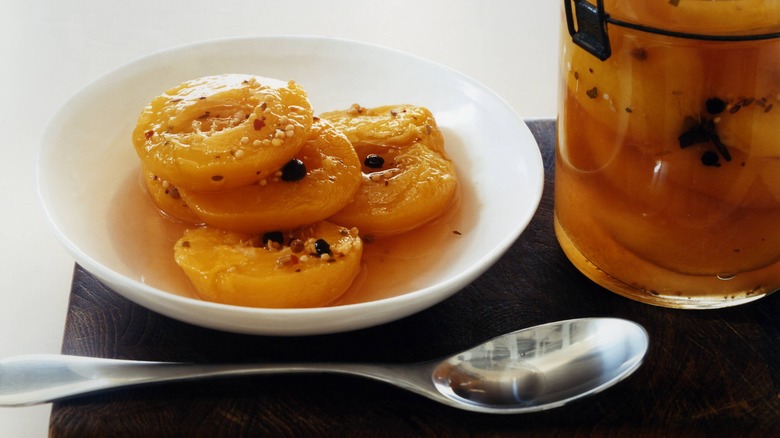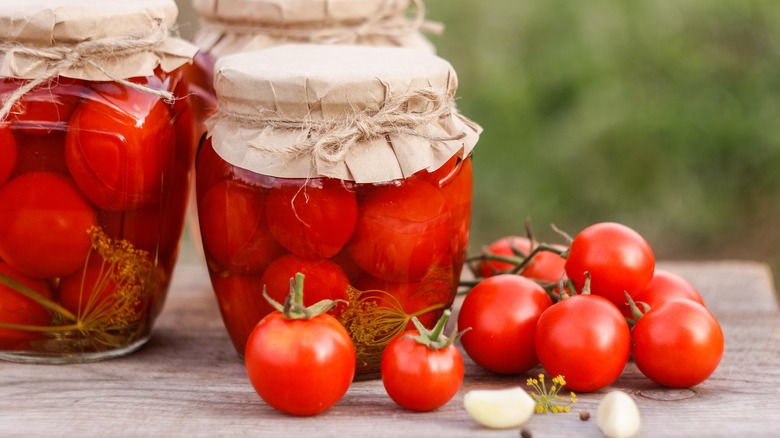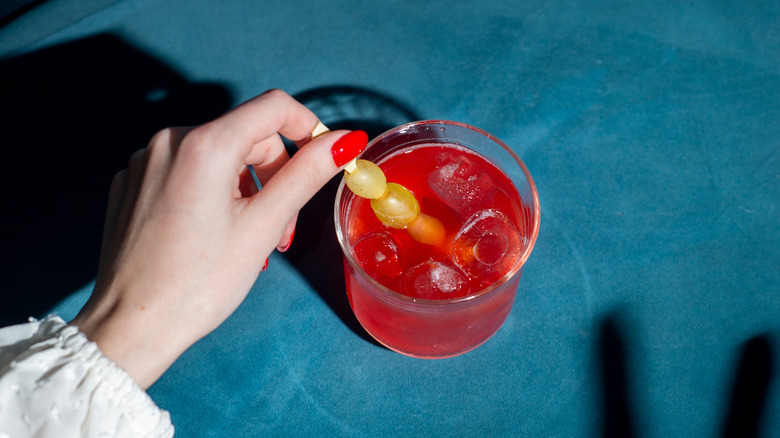Pickled Fruit Is The Ingenious Way To Use Up All That Summer Produce
We all know the feeling: the solemn and all-too-familiar changing of the guard. Out you go, bag of unused salad. Out you go, pears that were going to be poached but never made it out of the fridge drawer. And farewell to you, raspberries that would have been delicious five days ago. And welcome, new salad, new pears, and new berries. See you next week.
This problem is only exacerbated in summer. The warmer weather brings a glut of fantastic seasonal summer fruits — watermelons, cherries, peaches, tomatoes, and more. If you're into food, you probably have a fridge overflowing with the stuff, and not enough time in the day to use it all. But there's a solution, and it comes in a jar.
Pickling is the perfect way to use up all that summer produce in bulk and keep it delicious long enough for you to actually use. "Pickled fruit?" Yep. You read that right. It's admittedly an unusual way of preparing fruit, but it does a much better job of preserving (and enhancing) those original flavors — at least as opposed to making jam, which cooks the fruit down and loads it up with sugar. From desserts to the perfect savory sandwich filler, you'll open yourself up to a world of culinary possibilities.
So, how do you pickle fruit?
Pickling, like other forms of preserving, can be quite daunting to the home cook — but it can be shockingly simple! All you need is water, vinegar, sugar, and salt. A ratio of two parts water to one part vinegar, ½ part sugar, and a good pinch of salt is all you need. To prepare your fruit, you can slice it into chunks (this works well with big fruits like melon), thin slices like onion (great for apples), or, for berries and cherries, keep it whole. Then, bring the mixture to a boil, and pour it over the prepared fruit of your choosing in a jar. Seal it, let it cool, and voila! Fresh, delicious, and shockingly complex flavors that you can keep enjoying for weeks.
The pickled fruit will be good to eat as soon as it has cooled — but the wonderful thing about pickling is that the longer you leave it, the tastier and more complex the flavors will get. Some pickled fruits will stay good for months, letting you enjoy those summer favorites well into the fall. As a cook, it can be fascinating to explore how those flavors develop over time. One thing to note, though, is that homemade pickles should be kept in the fridge. While it'll help them stay at their most delicious, it's also necessary to ensure they stay safe to eat!
How should you use your pickled fruit?
The novelty of pickled fruit presents exciting opportunities for those of us who enjoy experimenting with food and can provide real inspiration, broadening our culinary horizons (and our palates).
They work brilliantly with sweets — pickled cherries make a fabulous dessert. Their acidity is beautifully rounded off by the sweetness of the cherry, and they're delicious when paired with sweet whipped cream, meringue, or even a cold crème anglaise! But those same cherries can also enliven savory dishes — pair them with a cut of grilled pork, for example (with which pickled apricot would also be excellent), or with some whipped ricotta on a piece of crusty sourdough toast.
It doesn't stop there — use the brine from the pickles to marinate chicken, infusing it with brightness and complexity (while making the cooking process a lot more forgiving). Pickled plums would work like a charm. Cook your rice in the pickled brine after cutting it with water for a herbaceous kick. Make some pickled watermelon and enjoy the best Greek salad you've ever had. Repurpose the brine and make more pickles! Or use the leftover liquid from your pickled strawberries to jazz up your digestif.
Pickling your fruit isn't just a way to make it last longer. Sure, it does just that — it's a great way to carry those summer flavors into fall, and it cuts down on food waste. But the real joy in this technique is in the exploration, in pushing our boundaries and making the familiar new again. Go ahead, make something weird. You might surprise yourself.



